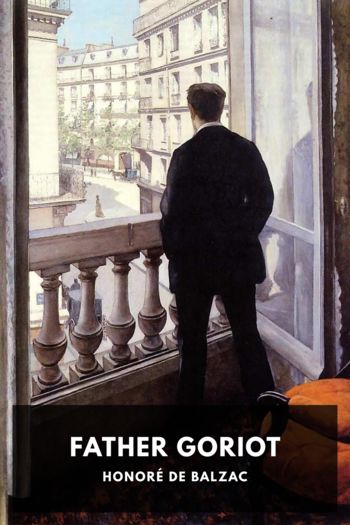Father Goriot - Honoré de Balzac (fantasy novels to read .txt) 📗

- Author: Honoré de Balzac
Book online «Father Goriot - Honoré de Balzac (fantasy novels to read .txt) 📗». Author Honoré de Balzac
Perhaps there are people who know that they have nothing more to look for from those with whom they live; they have shown the emptiness of their hearts to their housemates, and in their secret selves they are conscious that they are severely judged, and that they deserve to be judged severely; but still they feel an unconquerable craving for praises that they do not hear, or they are consumed by a desire to appear to possess, in the eyes of a new audience, the qualities which they have not, hoping to win the admiration or affection of strangers at the risk of forfeiting it again some day. Or, once more, there are other mercenary natures who never do a kindness to a friend or a relation simply because these have a claim upon them, while a service done to a stranger brings its reward to self-love. Such natures feel but little affection for those who are nearest to them; they keep their kindness for remoter circles of acquaintance, and show most to those who dwell on its utmost limits. Mme. Vauquer belonged to both these essentially mean, false, and execrable classes.
“If I had been there at the time,” Vautrin would say at the end of the story, “I would have shown her up, and that misfortune would not have befallen you. I know that kind of phiz!”
Like all narrow natures, Mme. Vauquer was wont to confine her attention to events, and did not go very deeply into the causes that brought them about; she likewise preferred to throw the blame of her own mistakes on other people, so she chose to consider that the honest vermicelli maker was responsible for her misfortune. It had opened her eyes, so she said, with regard to him. As soon as she saw that her blandishments were in vain, and that her outlay on her toilette was money thrown away, she was not slow to discover the reason of his indifference. It became plain to her at once that there was some other attraction, to use her own expression. In short, it was evident that the hope she had so fondly cherished was a baseless delusion, and that she would “never make anything out of that man yonder,” in the Countess’ forcible phrase. The Countess seemed to have been a judge of character. Mme. Vauquer’s aversion was naturally more energetic than her friendship, for her hatred was not in proportion to her love, but to her disappointed expectations. The human heart may find here and there a resting-place short of the highest height of affection, but we seldom stop in the steep, downward slope of hatred. Still, M. Goriot was a lodger, and the widow’s wounded self-love could not vent itself in an explosion of wrath; like a monk harassed by the prior of his convent, she was forced to stifle her sighs of disappointment, and to gulp down her craving for revenge. Little minds find gratification for their feelings, benevolent or otherwise, by a constant exercise of petty ingenuity. The widow employed her woman’s malice to devise a system of covert persecution. She began by a course of retrenchment—various luxuries which had found their way to the table appeared there no more.
“No more gherkins, no more anchovies; they have made a fool of me!” she said to Sylvie one morning, and they returned to the old bill of fare.
The thrifty frugality necessary to those who mean to make their way in the world had become an inveterate habit of life with M. Goriot. Soup, boiled beef, and a dish of vegetables had been, and always would be, the dinner he liked best, so Mme. Vauquer found it very difficult to annoy a boarder whose tastes were so simple. He was proof against her malice, and in desperation she spoke to him and of him slightingly before the other lodgers, who began to amuse themselves at his expense, and so gratified her desire for revenge.
Towards the end of the first year the widow’s suspicions had reached such a pitch that she began to wonder how it was that a retired merchant with a secure income of seven or eight thousand livres, the owner of such magnificent plate and jewelry handsome enough for a kept mistress, should be living in her house. Why should he devote so small a proportion of his money to his expenses? Until the first year was nearly at an end, Goriot had dined out once or twice every week, but these occasions came less frequently, and at last he was scarcely absent from the dinner-table twice a month. It was hardly expected that Mme. Vauquer should regard the increased regularity of her boarder’s habits with complacency, when those little excursions of his had been so much to her interest. She attributed the change not so much to a gradual diminution of fortune as to a spiteful wish to annoy his hostess. It is one of the most detestable habits of a Liliputian mind to credit other people with its own malignant pettiness.
Unluckily, towards the end of the second year, M. Goriot’s conduct gave some color to the idle talk about him. He asked Mme. Vauquer to give him a room on the second floor, and to make a corresponding reduction in her charges. Apparently, such strict economy was called for, that he did without a fire all through the winter. Mme. Vauquer asked to be paid





Comments (0)